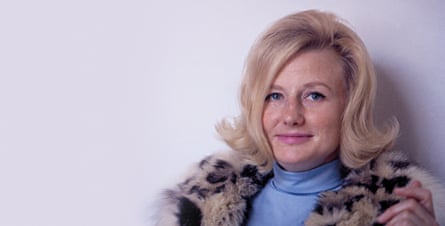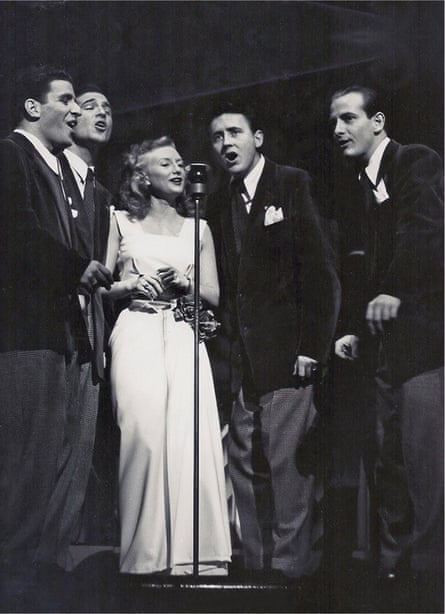With a name akin to a character from Roald Dahl’s stories and an equally naive singing voice some labelled as childish, Blossom Dearie hardly exuded star quality. “She was definitely not an entertainer,” admits Arlene Corwin, a friend and jazz singing contemporary of Dearie’s in mid-century nightclubs. “But her piano was great, her songs so beautifully polished and jazzy. And, of course, that little voice – pitch perfect, modest, unembellished.”
Now, 14 years after her death aged 84, the maverick New Yorker’s music is being re-evaluated: Kylie Minogue and Feist are self-professed fans, R&B star Ravyn Lenae has namechecked her, Jack White’s label is reissuing her work, Fugees and De La Soul have sampled her and Dearie songs can be heard everywhere from Call the Midwife to Starbucks playlists. “It was the whole combination,” says mod icon Georgie Fame of his one-time friend and mentor. “The unique sound of her voice, her way of playing and accompanying herself, her choice of unusual material. It’s the presentation of all those things.”
Born to an Ulster-Scots father and Norwegian mother, she was named Blossom after a neighbour delivered peach blossoms on the day of her birth in 1924. The young Dearie grew up in New York’s Catskill mountains and was a classical piano prodigy before exposure to recordings by Art Tatum and Erroll Garner led her to Manhattan – accompanied by her mother and older brother – where she would sing in vocal groups, play piano in cinemas and mingle with the city’s bebop jazz musicians.
After a decade of genteel poverty, Dearie relocated to Paris in 1952, desperate for a break. Here she impressed Parisians as well as Norman Granz, founder of US jazz label Verve Records. Back in New York, Dearie’s eponymous 1957 Verve album demonstrated a formidable pianist while her light, breathless voice and droll songs charmed some and infuriated others.
Over the next six years, Dearie released six well-received albums and built a US audience – Miles Davis and Bill Evans were early supporters – before the Beatles’ huge US success overwhelmed US popular music and led Capitol Records (the label she now shared with the Liverpudlians) to drop Blossom. But Dearie wowed British audiences after an invitation to perform at Annie’s Room in London in March 1965 – her performances mixed jazz with elements of pop and cabaret alongside a wit sharpened by her long New York apprenticeship. A residency at Ronnie Scott’s Soho jazz club in early 1966 led to regular BBC radio and television appearances. Most importantly, a contract with Fontana Records followed.
Dearie’s London sojourn is the focus of a new box set, Discover Who I Am: The Fontana Years London 1966-1970, including two CDs of previously unreleased studio recordings she made with Ronnie Scott’s band; it celebrates an idyll where Dearie found her playful creativity being embraced by a wide audience.
“I came to know Blossom in the 50s when she was working at a club in Greenwich Village called Trude Heller’s,” says Corwin. “She already had a bit of a reputation, and as a pianist singer myself, I was interested in hearing her. I loved her immediately – was even a little envious.” When Dearie arrived in Britain, Corwin watched as Blossom morphed from a New York also-ran into the toast of London town. “She had certainly changed for the better,” says Corwin. “She had developed a jokey patter in-between songs and become glamorised; gown, hair, makeup. Blossom got a fresh start at Ronnie Scott’s. Audiences loved her.”
Dearie, now 42, was adopted by the pop aristocracy making London swing – the beautiful people flocked to Blossom’s concerts and she, in turn, celebrated them in song. Hey John was written after she heard John Lennon praise her in an interview, the song Dusty Springfield was a tribute to the big-voiced pop icon, while Sweet Georgie Fame paid homage to Soho’s mod icon.
Fame notes how he will never forget the evening he first heard Blossom sing it. “It floored me. I was in shock. I wanted to crawl under the table with embarrassment! It’s such a great tune and, if it wasn’t about me, I’d record it and sing it.” Fame returned the compliment with Blossom, a song in celebration of Dearie on his 1970 album Seventh Son. “She was very softly spoken, had a twinkle in her eye and a wry sense of humour,” he says. “I remember being at her apartment once and watching her play piano. She had these tiny hands and delicate fingers and, despite this, had an unusually wide span which was very impressive. It was just one of the many remarkable things about her.”
On Dearie’s 1970 album That’s Just the Way I Want to Be she is accompanied by the cream of London’s jazz musicians and it possesses a lovely jazz-folk ambience. Paradoxically, the album is now best known for its closing track, I Like London in the Rain – the opening drum pattern being a celebrated breakbeat.

“My work with Blossom is being sampled? I had no idea,” says Spike Wells, the drummer who laid down the distinctive percussion, when I mention it. “I was obviously doing something right – not that I see any royalties!”
Wells started working with Dearie in 1967. “She was such a sweet person and a very good pianist – I loved her piano playing,” he says. “The most memorable experience with Blossom for me was when our trio toured Northern Ireland in 1969 and the Troubles were just getting under way. We were based in Belfast’s Europa hotel, which had very high security and, being cooped up together for 10 days, meant we really got to know each another.”
When they were not sharing the stage Wells describes Dearie as, “a bit of an enigma. Perhaps a bit bruised. She’d had quite a tough life trying to make it in the jazz scene as a woman”.
When That’s Just the Way I Want to Be flopped, Fontana dropped Dearie. Her London idyll over, Blossom returned to New York where, in 1974, necessity forced her to set up her own music publishing company and label, Daffodil Records. Back then few artists owned their music but Dearie, having found no industry interest post-Fontana, was determined to do so. Fifteen albums followed – initially sold at concerts and via mail order (Blossom packaging and posting out orders). Long-running Manhattan residencies at the Ballroom, followed by Danny’s Skylight Room – alongside a 15-year stint hopping over to London again to play at Pizza on the Park in Hyde Park Corner – meant she continued doing what she loved best.
The life of a niche jazz musician is inevitably challenging, but Dearie never quit. A silver lining came when she discovered her 60s-era BBC radio and TV broadcasts had established an Australian audience – Dearie toured there from 1979 on. When not working she often spent time at her brother’s rural residence in upstate New York. Beyond a brief marriage to Belgian musician Bobby Jaspar, Dearie was never known to have a significant other.
Her 2000 album Blossom’s Planet – followed three years later by a limited edition single, It’s Alright to Be Afraid – were her last recordings. Blossom gave a final performance in 2006 – by then her 1973 recording of Figure Eight (from Schoolhouse Rock, an educational cartoon) had been sampled by Fugees and De La Soul, alongside appearing on the soundtrack to Noah Baumbach’s comedy drama film The Squid and the Whale. In 2007 Minogue, a huge Blossom fan, proposed a collaboration – they met but Dearie, now being in fragile health, abstained. In 2009, she died in her sleep at her Greenwich Village apartment.
The obituaries were fulsome but its only now her catalogue is being given due respect: alongside the Verve and Fontana reissues, Blossom’s estate has been digitalising her Daffodil albums (most of which she issued solely on cassette). This would surely please a musician who devoted her life to her art – in her own quiet way.
“I knew Blossom rather well,” reflects Corwin, “although it was never really possible to know her ‘well’ – she not being the most open of people. I recall visiting her in her tiny apartment in Sheridan Square and the main impression I was left with was how many hours she practiced: the upright piano had a blanket backside so as not to disturb the neighbours.”

